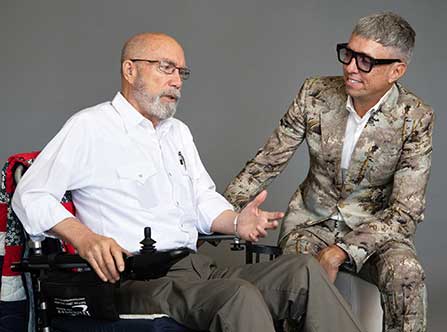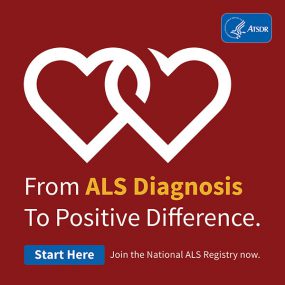May is ALS Awareness Month

In order to find answers about ALS, participation is crucial. The National ALS Registry helps connect people who are living with the disease to researchers looking for answers. This helps researchers learn more about what causes ALS and look for better treatments. Learn more about how we can all fight ALS together at cdc.gov/als.
May is ALS Awareness Month
To find answers about ALS, researchers count on participation from people living with ALS. The National ALS Registry helps connect people who are living with the disease to researchers looking for answers. This helps researchers learn more about what causes ALS and look for better treatments.
Amyotrophic lateral sclerosis (ALS) is a progressive neurodegenerative disease that affects nerve cells in the brain and spinal cord. The causes of ALS are unknown, and there is currently no cure. The National ALS Registry focuses on collecting information to help scientists learn more about who gets ALS, its potential causes, and possible treatments.
May is National ALS Awareness Month, a time dedicated to raising awareness about this disease and the people affected by it. The National ALS Registry would like to thank the thousands of people living with ALS who have already enrolled in the Registry.
The Registry could exist without the help of people living with ALS, caregivers, researchers, healthcare providers, neurologists, and supporters. Everyone touched by ALS has a story; stitching these stories together could ultimately help researchers put together a clearer picture in understanding this disease.
2024 ALS Registry Research Update

The Registry could not take place without the help of people living with ALS, caregivers, researchers, healthcare providers, neurologists, and supporters. Everyone touched by ALS has a story; piecing these stories together could ultimately help researchers come to a deeper understanding of the disease.
Research is critical to helping scientists and persons living with ALS better understand the disease. The overarching goal of the research is to examine potential risk factors for developing ALS. One of the fundamental functions of the National ALS Registry is to provide researchers with data to aid in pushing ALS research further along and to help fund this research.
- Since ALS Awareness Month in 2023, the Registry has been involved in nine new publications of ALS research: with such topics as comparing National ALS Registry data with state ALS registry data, creating a roadmap of ALS prevention strategies, and studying how hobbies and exercise affect ALS in Michigan.
- Additionally, the Registry has funded, through ATSDR’s research grant funding mechanism, two brand new ALS research projects by the University of Michigan and the ALS Therapy Development foundation to look at different ALS risk factors.
- ATDSR opened a brand-new grant opportunity to “Identify and Evaluate Potential Risk Factors for Amyotrophic Lateral Sclerosis (ALS)” at the end of 2023.
- The Registry’s Clinical Trial Notification system is helping six new clinical trials in 2024 recruit study participants.
The National ALS Registry is steadfast in its commitment to push ASL Research along and continues to count on researchers and Registry members to participate.
You can learn more about the new research involving the Registry at the following links:
External Research funded by the National ALS Registry
Active ALS Research Notification for Clinical Trials and Studies
Helping Your Voice Be Heard
The National ALS Registry has held its Annual Surveillance Meeting in the Fall since 2011. This meeting has been an important way for neurologists, researchers, advocacy groups, and especially patients and caregivers, to provide guidance and direction for the Registry’s initiatives.
The meeting in 2023 saw a change in format with the meeting being held virtually and invitations open to the general public. The meeting was moderated by ALS Patient Advocate Andrea Pauls Backman and included updates from the Registry’s many research partners, a Patient Perspective Panel where three people with ALS were invited to speak, and a forum for open discussion for the public to participate in. Due to the resounding success of the past two years’ meetings, along with the public’s support of this new open format, the Registry will again hold the 2024 meeting virtually.
This year’s meeting will be held on September 4th-5th, and we are happy to announce that Andrea Pauls Backman will be moderating the meeting again. More information regarding the meeting agenda and invitation details will be provided leading up to the meeting dates.
If you’re interested in finding out about previous Annual Meetings, past agendas, and summary reports can be found at the Registry’s website at:
https://www.cdc.gov/als/AnnualMeetings.html
ALS Research Counts on You
ALS Research would not be possible without participation from people with ALS, researchers, caregivers, healthcare providers, and more. The National ALS Registry is proud to work alongside all of these people and other organizations to continue ALS research and aim to find answers.
Learn more about how we can find answers together at cdc.gov/als.


